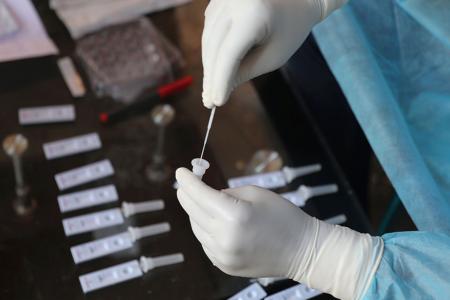Experts dispute claims of very infectious virus variant
Experts say D614G variant has been circulating here since February, expect virus to continue mutating
Experts in Singapore say there is no basis for Malaysia's claim that it has found a strain of the coronavirus that is 10 times more infectious.
They also say this strain - D614G - which is already found in Singapore, will have no impact on vaccine development. The variant has also been found in the Philippines.
Malaysia's director-general of Health, Dr Noor Hisham Abdullah, had posted on his Facebook page on Sunday that this mutation, which he said had been "found by scientists in July 2020" and now identified in three patients in Malaysia, is "10 times easier to infect other individuals" with Covid-19.
He added that vaccines being developed may be ineffective against this mutation.
But Professor Wang Linfa, director of the Programme in Emerging Infectious Diseases at Duke-NUS Medical School, told The Straits Times that there is "no real scientific data to make the claim that D614G is more transmissible, let alone the 10-fold claim".
His programme deputy, Professor Ooi Eng Eong, added: "This mutation would certainly not impact vaccine efficacy since vaccines would generate antibodies that bind many different parts of the virus spike protein and not just be limited to the site of mutation."
Associate Professor Hsu Liyang, an infectious diseases specialist and epidemiologist at the National University of Singapore's Saw Swee Hock School of Public Health, said this mutation has been circulating here since February.
Singapore sequences a sampling of the virus from patients, and has found more than 100 with this mutation between February and July.
Since only a fraction of virus samples are sequenced, Prof Hsu said it would likely mean that thousands of infections here are due to the D614G mutation.
Dr Sebastian Maurer-Stroh, deputy executive director (Research), Bioinformatics Institute, Agency for Science, Technology and Research (A*Star), said mutations are natural steps in the evolution of viruses.
He told The Straits Times: "There is no need to panic. Since this variant has been circulating globally it can be expected to be seen in any country, and every country with active surveillance has seen it already, especially related to import from travellers."
He expects the virus to continue mutating, and in fact, there are already six new groupings.
Experts are still debating if D614G spreads more easily.
Dr Asok Kurup, who chairs the Academy of Medicine's Chapter of Infectious Disease Physicians, said there has been no clinical impact from the mutation.
But he added that should any mutation prove more infectious, then current measures such as masking and social distancing become even more important.
FOR MORE, READ THE STRAITS TIMES
Get The New Paper on your phone with the free TNP app. Download from the Apple App Store or Google Play Store now



